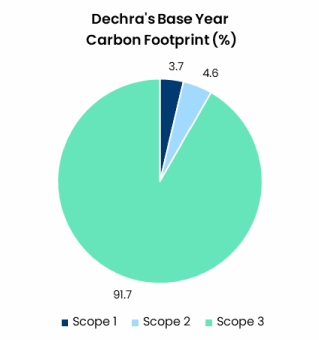Approval of Science-Based Targets
As part of our sustainability commitment to drive climate action for a more resilient planet, Dechra has set near term and long term net-zero science-based targets (SBT) which have been validated by the Science Based Targets initiative (SBTi). Setting these targets proves our commitment to reducing harmful greenhouse gas (GHG) emissions across the value chain in line with the latest climate science.
What is the Science Based Targets initiative?
The Science Based Targets initiative is a global body enabling businesses to set ambitious emissions reduction targets in line with the latest climate science. It is focused on accelerating companies to halve emissions before 2030 and achieve net-zero emissions before 2050, and strives to limit the global temperature increase in this century to 2°C while pursuing efforts to limit the increase further to 1.5°C.
The SBTi is a registered charity, with a subsidiary which hosts their target validation services. The organisation is partnered with the CDP, the United Nations Global Compact, the We Mean Business Coalition, the World Resources Institute (WRI), and the World Wide Fund for Nature (WWF).
What does this validation mean for Dechra?
Near term target validation:
The SBTi’s Target Validation Team has determined that our near term target ambition is in line with a 1.5°C trajectory. They commend our 1.5°C-aligned target, currently the most ambitious designation available through the SBTi process.
This near term target approval means that by 2030, Dechra commits to:
- reduce absolute Scope 1 and 2 GHG emissions by 42% from a 2021 base year carbon footprint calculation; and
- reduce Scope 3 GHG emissions by 51.6% from a 2021 base year carbon footprint calculation per GBP value added.
As shown in the accompanying graph, our total footprint of 157kt Co2e is currently dominated by Scope 3 at 91.7% with Scope 1 and 2 combined only accounting for 8.3%.
Long term net-zero target validation:
After receiving validation of our near term targets, the SBTi also determined that our long term net-zero targets are aligned with the their 1.5°C mitigation pathways for reaching net-zero emissions by latest 2050. The SBTi commends Dechra's ambitious net-zero target, currently the most ambitious designation available through the SBTi process.
With this approval, Dechra commits to reduce absolute scope 1 and 2 GHG emissions 90% by latest 2050 from a 2021 base year. We also commit to reduce scope 3 GHG emissions 97% per GBP value added within the same timeframe.

More about scopes
A company's direct and indirect emissions are grouped into one of three scopes. These emissions can occur throughout the process of business operations, whether upstream or downstream.
Scope 1: Direct emissions from sources such as company facilities and vehicles
Scope 2: Indirect emissions from purchased energy sources such as steam, electricity, and heating and cooling
Scope 3: All other indirect emissions sources that occur throughout the value chain such as transportation, employee travel, waste, fuel, end of life treatment, purchased goods and services, and leased assets
Dechra knows the world must reach net-zero emissions no later than 2050, and companies have a crucial part to play. We’re proving our commitment to building a resilient future for all and aligning with a net-zero future by setting science-based targets.
